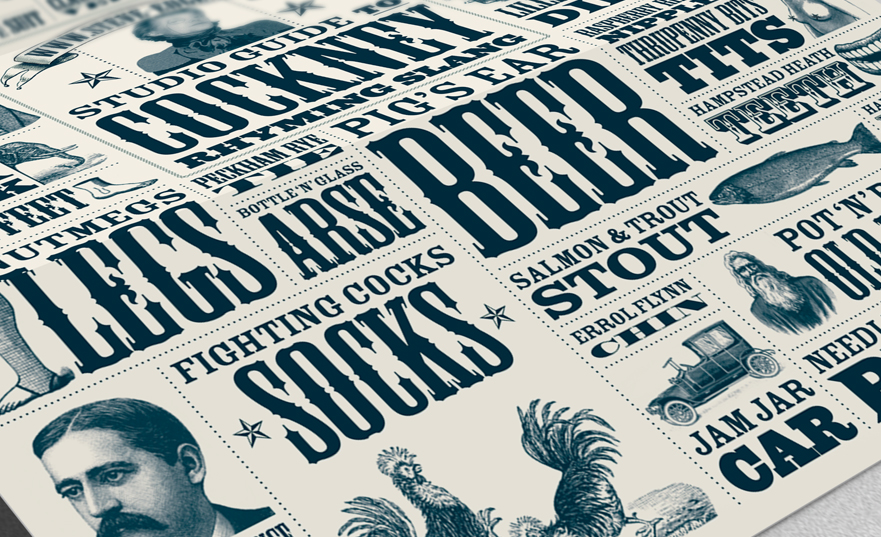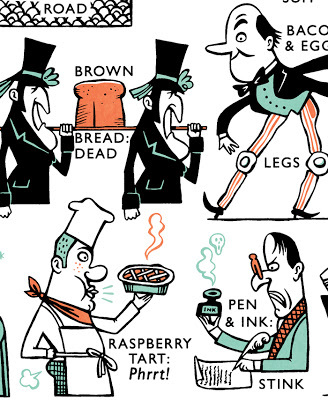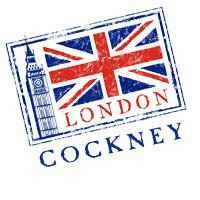History of Cockney Rhyming Slang:
The cockney language can be traced back to the early part of the 19th Century, when Sir Robert Peel formed the first Police force stationed at Bow Street, London. They were known as the Bow Street Runners, Peelers and even Bobbies. This was in 1824, and the slang, as mentioned above, was to hide the true meaning of discussions from both the Police and the nonces (informers for the Police).
The origins of Cockney Rhyming Slang are uncertain. It's not really a language since the words spoken are clearly English; on the other hand, it's not a dialect either, since the speakers of this slang are also perfectly capable of not using it! Some stories go that this slang originated in the market place so that the vendors could communicate without the customers knowing what was being said. You wouldn't want your customers knowing that you were going to lower your prices in ten minutes so you could go home early.
Some slang expressions have escaped from London and are in popular use throughout the rest of Britain. For example 'use your loaf' is an everyday phrase for the British, but not too many people realise it is Cockney Rhyming Slang (loaf of bread means head). There are many more examples of this unwitting use of Cockney Rhyming Slang.
Rhyming slang has also spread to many English-speaking countries, especially those that had strong maritime links with the UK in the 19th Century, notably Australia, Ireland and Canada/USA. There's even less justification for the name these days than there was when it was coined. Many examples of Cockney Rhyming Slang clearly originate in other countries, although England, and specifically London, is still the major source.
Here are some great examples of Cockney Rhyming Slang:
- ADAM AND EVE = believe = as in "would you Adam and Eve it?"
- ALMOND ROCKS = socks
- APPLES AND PEARS = stairs
- ARMY AND NAVY = gravy
- BACON AND EGGS = legs
- BAG OF FRUIT = suit
- BAKED BEAN = queen
- BALL AND CHALK = walk
- BARNABY RUDGE = judge
- BARNET = Barnet Fair = hair
- BOAT = boat race = face
- BORROW AND BEG = egg
- BRASS BANDS = hands
- BREAD AND HONEY = money
- BROWN BREAD = dead
- BUBBLE BATH = laugh
- BUTCHER'S = butcher's hook = look
- CHALK FARM = arm
- CHINA = china plate = mate
- CHRISTIAN SLATER = later
- CREAM CRACKERED = knackered (exhausted)
- CURRANT BUN = sun
- DAISIES = daisy roots = boots
- DANNY MARR = car
- DICKY = dicky dirt = shirt
- DICKY BIRD = word
- DOG = dog and bone = phone
- DONKEY'S EARS = years
- DUKE OF KENT = rent
- DUSTBIN LID = kid
- FLOWERY DELL = ( prison ) cell
- FROG = frog & toad = road
- GREGORY = Gregory Peck = neck, or cheque
- HAM 'N' CHEESY = easy
- HAMPSTEADS = Hampstead Heath = teeth
- HAMPTON WICK = prick (i.e. penis)
- HALF-INCH = pinch (i.e. steal)
- JACK = Jack Jones = alone ("On my Jack" = "On my own")
- JAM JAR = car
- JAM TART = heart
- JUGS = jugs of beer = ears
- KICK AND PRANCE = dance
- LOAF = loaf of bread = head ("use your loaf")
- LUCY LOCKETT = pocket
- MINCES (or mincers) = mince pies = eyes
- NORTH AND SOUTH = mouth
- OILY RAG = fag (i.e. cigarette)
- ONES AND TWOS = shoes
- PECKHAM RYE = tie (i.e. necktie)
- PEN AND INK = stink
- PETE TONG = wrongPLATE OF MEAT = street
- PLATES = plates of meat = feet
- PORKY = pork pie = lie, e.g. "He's telling porkies!"
- RABBIT = rabbit and pork = talk
- RASPBERRY = raspberry tart = fart (as in "blowing raspberry/ies" = making rasping noises with your mouth)
- RICHARD = Dicky Bird = bird (slang for girl) but also Dicky Bird = word
- ROSIE = Rosie Lee = tea e.g. "Have a cup of Rosie"
- ROUND THE HOUSES = trousers
- RUB-A-DUB-DUB = pub = public house
- RUBY = Ruby Murray (popular singer in the 1950s born in Belfast ) = curry
- SCARPER = Scapa Flow = go (as in "run for it!")
- SEPTIC = septic tank = Yank (slang for an American)
- SEXTON BLAKE = cake
- SHERBET DAB = (taxi) cab
- SKIN = skin and blister = sister
- SKY = sky rocket = pocket
- TEA LEAF = thief
- TATERS = Potatoes in the mould = cold
- TITFER = tit for tat = hat
- TOM AND DICK = sick
- TOMFOOLERY = jewellery
- TREACLE = treacle tart = sweetheart
- TROUBLE = trouble and strife = wife
- UNCLE TED = bed
- WEASEL AND STOAT = coat
- WHISTLE = whistle and flute = suit = as in "a nice whistle"




